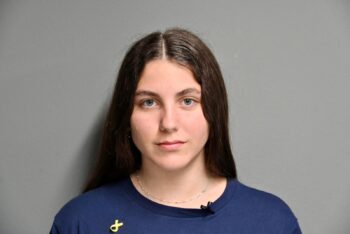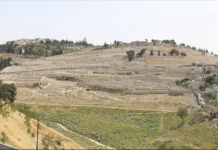When Ella Shani Kozin and her family learned her cousin Amit was a hostage in Gaza, they were surprisingly joyful.
“We celebrated it like no tomorrow. We hugged each other and laughed and sat down and drank together,” Ella, 15, says. “Because being a hostage was the best outcome we could hope for. We knew he was not rescued. So, the other two options were he was a hostage and we would get him back or he was murdered and it was just a matter of time to find his body.”
“In what world should we be happy when a family member is hostage?” she asks.

Ella Shani Kozin is a survivor of the Oct. 7 surprise attack that killed 1,200 Israelis and took another 240 hostage (Israel believes 80 hostages are still being held in Gaza). She lived in kibbutz Be’eri near the border of Gaza, at a distance that gives Israelis 15 seconds to reach a concrete safe room if rockets are launched.
One month after the butchery, Ella traveled to America as part of a delegation of eyewitnesses who shared their story before American audiences. To talk about the surreal horrors she witnessed was therapeutic and helped combat the avalanche of pro-Gaza propaganda. She visited the Lighthouse Christian Academy in Santa Monica on June 4 to share photos, videos and her testimony.
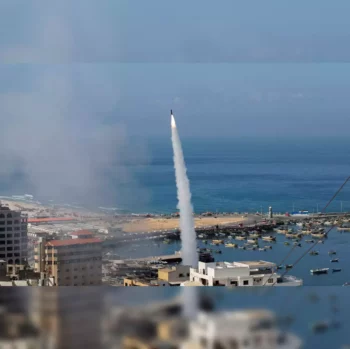
Hamas – the extremist leaders of Gaza who embrace the path of bloodshed to wipe Israel off the map – launched the vicious surprise attack the day after Yom Kippur, the holiest day for Jews. It was not just symbolic – the day an Arab coalition attacked Israel in 1973. It was strategic: more soldiers would be on holiday from the Israeli Defense Forces than at any other time.
For Ella, the ordeal started at 6:30 a.m. with a barrage of rockets. Like most Israelis, her family had a thick concrete walled room known as a safe room, in which Israelis can survive a direct hit from a rocket. Ella, her mother, her little brother and a sleep-over friend of her brother immediately took refuge there.

A short time later, messages on her teen group WhatsApp chat warned of terrorist soldiers in the kibbutz, a communal living community unique to Israel. Then she heard gunshots and men shouting in Arabic. Someone tried to enter their house but left and went elsewhere.
At 9:30 a.m. she got the message that her uncle’s house was on fire. He was inside the safe room and would remain there and try to survive the smoke inhalation.
The 100 or so teens on the group text messaged variously: “My mother was shot,” “Get me out of here,” “My brother is dead,” “Anyone with a connection to the IDF, tell them to come rescue me.” As the bloodbath unfolded, Ella felt utter helplessness.
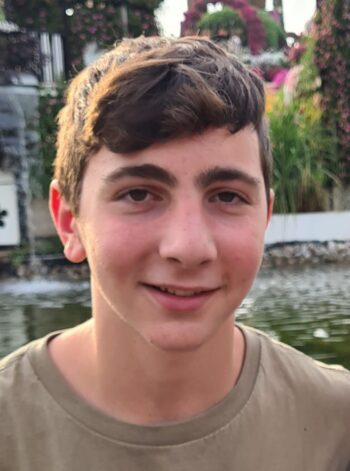
At 2 p.m., she found out her grandparents had been shot.
At 5:30 p.m., the IDF finally showed up. The Israeli soldiers with canines escorted them running to another house, where several families had huddled together. Two Israelis were dead in the living room. Their organs had been torn out and thrown around the room. They lay there on the floor.
Then the IDF escorted Ella with several families out of the kibbutz. She witnessed scenes during their evacuation that looked like an apocalypse.
“Most of the buildings were on fire,” she says. Ella saw trails of blood and puddles of blood. She noted a distinction between the bodies of the Israelis who were dead and the terrorists who were dead. The Israelis were horribly mistreated, beheaded, and some had body parts chopped off. Their bodies had been burned. The terrorists suffered no such indignities.
The putrid smell of fires and burning flesh filled the air.
 When Ella and the others got to the bus, she noticed all the windows had been shot out. The seats were covered with shattered glass. They filled the bus to standing room only. Several of the rescued vomited on themselves as they processed the ghastly scenes they had just witnessed.
When Ella and the others got to the bus, she noticed all the windows had been shot out. The seats were covered with shattered glass. They filled the bus to standing room only. Several of the rescued vomited on themselves as they processed the ghastly scenes they had just witnessed.
A friend of her brother came up to them, his eyes wide with shock. He didn’t have pants on, just his boxers. He was barefoot and without his glasses. There was blood on his face. “Eyal,” he said. “You won’t believe what happened. I saw how they killed my dad and my little sister.”
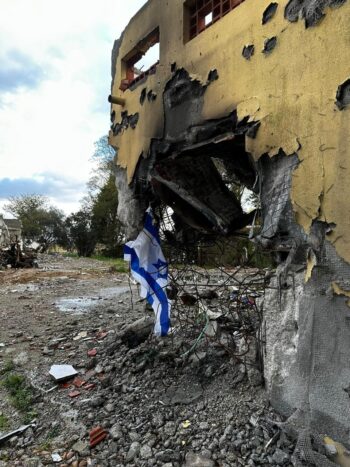
His sister, a 9-month-old, had died in her mother’s arms. The bullet passed through the toddler and into Mom. The boy didn’t know if the mom was alive or dead. He boarded the bus alone. Later, he found out she had survived, and they were reunited.
The bus took them northward to Tel Aviv, a safer city far enough away from the conflagration, and dropped them off at a train station. By chance some soldiers had just gotten off the train and tried to comfort the rescued, who were in shock. They hugged them and offered them snacks.
When another rocket alarm sounded, Ella and the families lay on the ground. The IDF soldiers lay on top of them to shield them from falling debris.
Later, they hurried into the train station, where it was safer.
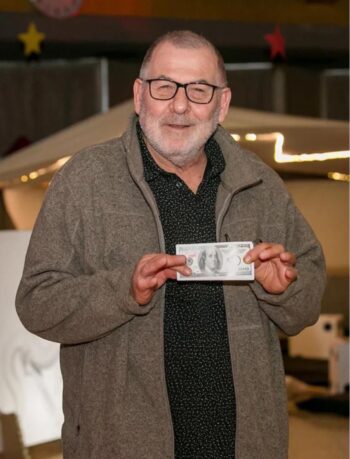
“We all started crying,” Ella says. “Up until that moment, I hadn’t cried. I couldn’t process everything that was happening. My dad wasn’t answering text. My uncle’s house was burned down. I didn’t know about my grandparents.
“I felt like I had lost everything.”
Then she got the news that her cousin Amit had been kidnapped. It was unconfirmed.
Terrorist tied Amit’s hands behind his back. They took selfies with the women and stole their jewelry, she was told.
At 11 p.m., Ella learned that her grandparents were being taken to the hospital. Grandpa had suffered smoke inhalation. Grandma had taken three bullets to her body. After bleeding for nine hours in the safe room, she insisted on walking to the ambulance and not being carried, Ella says.
Ella, her mother and brother were eventually given refuge in a hotel.
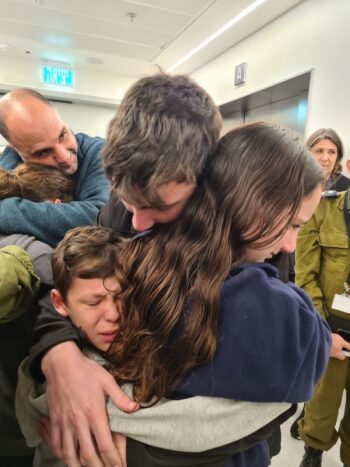 Four days later, she found out that her dad, who hid in the attic during the attack, had been killed. His body was partially burned. “My only hope and consolation is that he died before he was burned,” she says.
Four days later, she found out that her dad, who hid in the attic during the attack, had been killed. His body was partially burned. “My only hope and consolation is that he died before he was burned,” she says.
The loss of her father raises a specter she will face for the rest of her life. Ella had a difficult relationship with her dad, she says. But was planning to patch things up. She vowed to a friend that the next time she saw him, she would call him – finally – “Dad.”
That day never came because the Oct. 7 attacks cut short her plan.
“On the same day I decided to say ‘Dad,’ terrorists came out of nowhere and shot him to death,” Ella says. “Things can happen at any time, so if you have something to say or do, don’t be like me and put it off. If I live 60 more years, it’s going to be 60 years of regret that I didn’t say that one way. It’s torture.”

They buried Itzik Kozin the next day. His body was already decomposing when they found it.
“I couldn’t process it. I was too upset and in denial. I texted him after they told me he was murdered, and I got pretty angry that he didn’t respond, because I used to text him and one minute later he used to text me back. Suddenly he was not answering.”
She didn’t have time to grieve. Within hours, they heard that Amit was officially listed as a hostage.
It was grim news, but it was better than the alternative. It was better than being officially listed as dead.
Ella and her family celebrated.
Amit was eventually released from captivity and restored to his family.
“People are saying, ‘Stop the genocide and release the hostages.’ They’re saying it backwards,” she says. “It needs to be, ‘Release the hostages first.’”
To learn more about a personal relationship with Jesus, click here.
About this writer: Michael Ashcraft reports from Los Angeles where he pastors the Lighthouse Church in Van Nuys, CA.

